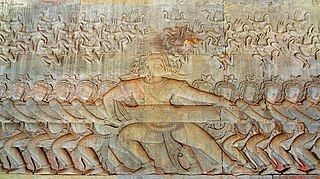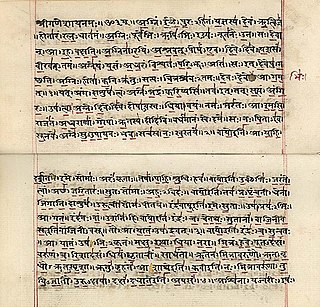
Asuras are a class of beings in Indic religions. They are described as power-seeking clans related to the more benevolent Devas in Hinduism. In its Buddhist context, the word is sometimes translated "titan", "demigod", or "antigod".

Aditi is an important Vedic goddess in Hinduism.

Chandra, also known as Soma, is the Hindu god of the Moon, and is associated with the night, plants and vegetation. He is one of the Navagraha and Dikpala.

Varaha is an avatar of the Hindu god Vishnu, in the form of a boar. Varaha is generally listed as third in the Dashavatara, the ten principal avatars of Vishnu.
Savitṛ, also rendered as Savitur, in Vedic scriptures is an Aditya i.e. off-spring of the Vedic primeval mother goddess Aditi. His name in Vedic Sanskrit connotes "impeller, rouser, vivifier."

Angiras or Angira was a Vedic rishi (sage) of Hinduism. He is described in the Rigveda as a teacher of divine knowledge, a mediator between men and gods, as well as stated in other hymns to be the first of Agni-devas. In some texts, he is considered to be one of the seven great sages or Saptarishis, but in others he is mentioned but not counted in the list of seven great sages. In some manuscripts of Atharvaveda, the text is attributed to "Atharvangirasah", which is a compound of sage Atharvan and Angira. The student family of Angira are called "Angira", and they are credited to be the authors of some hymns in the first, second, fifth, eighth, ninth, and tenth books of the Rigveda. By the time of the composition of the Rigveda, the Angirases were an old Rishi clan, and were stated to have participated in several events.
The Shatapatha Brahmana is a commentary on the Śukla (white) Yajurveda. It is attributed to the Vedic sage Yajnavalkya. Described as the most complete, systematic, and important of the Brahmanas, it contains detailed explanations of Vedic sacrificial rituals, symbolism, and mythology.

Yajna refers in Hinduism to any ritual done in front of a sacred fire, often with mantras. Yajna has been a Vedic tradition, described in a layer of Vedic literature called Brahmanas, as well as Yajurveda. The tradition has evolved from offering oblations and libations into sacred fire to symbolic offerings in the presence of sacred fire (Agni).

Ushas is a Vedic goddess of dawn in Hinduism. She repeatedly appears in the Rigvedic hymns, states David Kinsley, where she is "consistently identified with dawn, revealing herself with the daily coming of light to the world, driving away oppressive darkness, chasing away evil demons, rousing all life, setting all things in motion, sending everyone off to do their duties". She is the life of all living creatures, the impeller of action and breath, the foe of chaos and confusion, the auspicious arouser of cosmic and moral order called the Ṛta in Hinduism.

The Vedas are a large body of religious texts originating in ancient India. Composed in Vedic Sanskrit, the texts constitute the oldest layer of Sanskrit literature and the oldest scriptures of Hinduism.
Pushan is a Hindu Vedic solar deity and one of the Adityas. He is the god of meeting. Pushan is responsible for marriages, journeys, roads, and the feeding of cattle. He was a psychopomp, conducting souls to the other world. He protected travelers from bandits and wild beasts, and protected men from being exploited by other men. He was a supportive guide, a "good" god, leading his adherents towards rich pastures and wealth.
In Hindu mythology, Sarama is a mythological being referred to as the female dog of the gods, or Deva-shuni. She first appears in one of Hinduism's earliest texts, the Rig Veda, in which she helps the king of the gods Indra to recover divine cows stolen by the Panis asuras. This legend is alluded to in many later texts, and Sarama is often associated with Indra. The epic Mahabharata, and some Puranas, also make brief reference to Sarama.

In Hinduism, there are diverse approaches to conceptualizing God and gender. Many Hindus focus upon impersonal Absolute (Brahman) which is genderless. Other Hindu traditions conceive God as bigender, alternatively as either male or female, while cherishing gender henotheism, that is without denying the existence of other Gods in either gender.
The seventh Mandala of the Rigveda has 104 hymns. In the Rigveda Anukramani, all hymns in this book are attributed to Vashista. Hymn 32 is additionally credited to Sakti Vashista, and hymns 101-102 are additionally credited to Kumara Agneya. It is one of the "family books", the oldest core of the Rigveda, which were composed in early vedic period.
Rigvedic deities are deities mentioned in the sacred texts of Rigveda, the principal text of the historical Vedic religion of the Vedic period.
The Taittirīya Shakha, is a shakha of the Krishna (black) Yajurveda. Most prevalent in South India, it consists of the Taittirīya Samhita ('TS'), Taittirīya Brahmana ('TB'), Taittirīya Aranyaka ('TA'), and Taittirīya Pratisakhya ('TP').
Originating in historical Vedic religion, 'Pravargya', also known as 'Ashvina-pravaya', is an introductory or preliminary ceremony to the Soma Yajña.

The Rigveda or Rig Veda is an ancient Indian collection of Vedic Sanskrit hymns (sūktas). It is one of the four sacred canonical Hindu texts (śruti) known as the Vedas. Only one Shakha of the many survive today, namely the Śakalya Shakha. Much of the contents contained in the remaining Shakhas are now lost or are not available in the public forum.
Avatsara was a Rishi of the Rig Veda. His name first appears in the Fifth Mandala which is older than the Second Mandala.

Agni is a Sanskrit word meaning fire and connotes the Vedic fire deity of Hinduism. He is also the guardian deity of the southeast direction and is typically found in southeast corners of Hindu temples. In the classical cosmology of the Indian religions, Agni as fire is one of the five inert impermanent elements (pañcabhūtá) along with space (ākāśa), water (ap), air (vāyu) and earth (pṛthvī), the five combining to form the empirically perceived material existence (Prakṛti).













